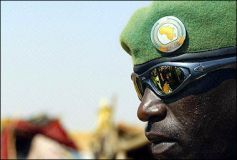African Union struggles to save Darfur talks as Sudan halts offensive
ABUJA, Dec 19 (AFP) — African Union mediators battled to breathe life into Darfur’s peace talks on Sunday after the Sudanese government belatedly agreed to call off an offensive against rebel positions in the western region.

|
|
A Rwandan soldier belonging to the African Union Force patrols a section of the Abu Shouk displaced camp in the outskirts of El-Fasher, Sudan. (AFP). |
On Saturday, Khartoum had dealt the Abuja peace process a near fatal blow, brushing aside international pressure on it to honour a ceasefire deal and instead launching attacks on the rebel-held southern Darfur town of Labado.
But one day after the AU mediators’ deadline for compliance with the truce, Sudanese Foreign Minister Mustafa Osman Ismail said that government troops would henceforth respect the agreement signed by the parties in the Chadian capital Ndjamena in April.
A joint Sudan-UN “mechanism has asked the government and the rebels to stop the fighting immediately, and the Sudanese government has agreed to comply with this demand as of today,” Ismail told reporters in Khartoum.
Sudan is ready to pull its forces back to the positions it held before the April deal, he said, as long as the rebels do likewise.
Senior AU diplomat Sam Ibok told AFP in Abuja that the mediators would talk with the current chairman of the Union, President Olusegun Obasanjo of Nigeria, before deciding whether to call for another round of peace talks.
“The mediation team have an appointment with the president, and we want to brief him on the mediation efforts so far, to allow us to meet with the parties thereafter,” he said.
The rebels — who since Tuesday have been refusing face-to-face contact with government envoys in protest at the latest offensive — said that a decision on whether to revive the political process rested with the Union.
“Our position as the two movements is that we have the will to reach the end of this round of talks,” said Mohammed Ahmed Tugod, chief negotiator of the armed opposition group the Justice and Equality Movement (JEM).
“It’s for the African union to decide on the collapse of the talks. The Sudan government should take responsibility if this round of talks collapses,” he said at a joint news conference with the Sudan Liberation Movement (SLM).
On Saturday — while not sparing the rebels from criticism over attacks on aid workers and police stations — the African Union has been very clear in its condemnation of the Khartoum government’s latest offensive into southern Darfur.
Khartoum’s decision also dealt a severe blow to the AU’s bid to resolve the crisis without broader international intervention and increased the likelihood that the United Nations will be asked to take action.
AU spokesman Assane Ba said the 53-nation body’s chairman, Obasanjo, and the head of the AU Commission, Alpha Oumar Konare, would be informed of the clashes and take a decision on the future of the talks.
As Saturday’s deadline came and went with no sign of the government backing down, the commander of the AU observer force in Darfur told international envoys in Abuja that government helicopters were bombarding Labado.
At the same time, from his headquarters in Addis Abeba, Konare issued a statement calling on Khartoum “to immediately stop its present military offensive and withdraw its forces to their former positions”.
“The chairperson reiterates the undertaking by the AU commission to bring any serious violation to the attention of the AU Peace and Security Council and the UN Security Council,” he warned.
Darfur has been the embroiled in conflict since February last year, when the two rebel movements launched a revolt against Khartoum, claiming that the Arab-led government had marginalised and persecuted the region’s black African tribes.
In the subsequent crackdown, pro-government militias have attacked black communities, murdering and raping tens of thousands of civilians and driving more than 1.6 million from their homes, according to the United Nations.
